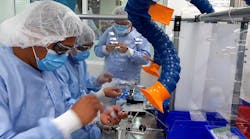Smiths Medical
Plymouth, MN
Medical device manufacturer
8,000 employees | 25 sites | 18 EHS professionals
For Smiths Medical, good isn’t good enough.
It’s not good enough to have already won the America’s Safest Companies award before (in 2015).
It’s not good enough that the global medical device manufacturer meets the minimum safety requirements set forth in each of the six continents it operates. It’s not good enough that the company has a safety rate six times lower than industry average.
After discovering many sites within the same federal governing body had variations in EHS policies, Smiths Medical sought to establish a minimum global standard. Regional managers and representatives from each region were tasked with creating a global library of tools, resources and training materials that go beyond external regulatory requirements. These requirements will be the foundation for a new internal audit process to be developed in FY2021.
“Regardless of our regional requirements, we have set a global standard in EHS programs that all sites are measured against to ensure every site meets our program and performance expectations,” says Shane Menefee, senior director HSSE facilities at Smiths Medical. “With robust reporting analysis of risk, we will continue to develop any tool or resource necessary, regardless of OSHA or EPA standard, to prevent the recurrence of losses that could harm our employees or the environment.”
Smiths Medical is relentless in its efforts to achieve its goal of global zero harm. Its EHS program is mature, complex and dynamic. Each year, EHS is incorporated into the company’s corporate objectives to ensure accountability and empower employees at all levels to have a safe workplace. Many of its programs are a result of this pursuit.
In 2020, the company created a new risk analysis tool called CAIRO (Compliance, Aspects, Impacts, Risk Opportunities) to simplify how sites analyze their risk by likelihood and severity, control implementation and monitoring practices. As incidents occur and controls are added, CAIRO will be updated to reflect a site’s strengths and weaknesses.
CAIRO builds upon Smiths Medical’s existing efforts to enforce workplace safety through its mandatory Safety Leading Indicator Activities (SLIAs), which include site leadership tours, compliance audits for high-risk EHS programs, employee engagement of 60% or better in EHS programs (excluding required training and activities), and hazard tickets resolved within 30 days of submission at a rate of 75% or better.
Many sites also have employee-led EHS site safety committees or performance teams to assess their site’s performance in diverse EHS programs, which receive buy-in and a dedicated budget from management, even when there’s no obvious return on investment.
“We view strong EHS performance as a strategic advantage to accelerate and sustain our business in the future,” Menefee says.

